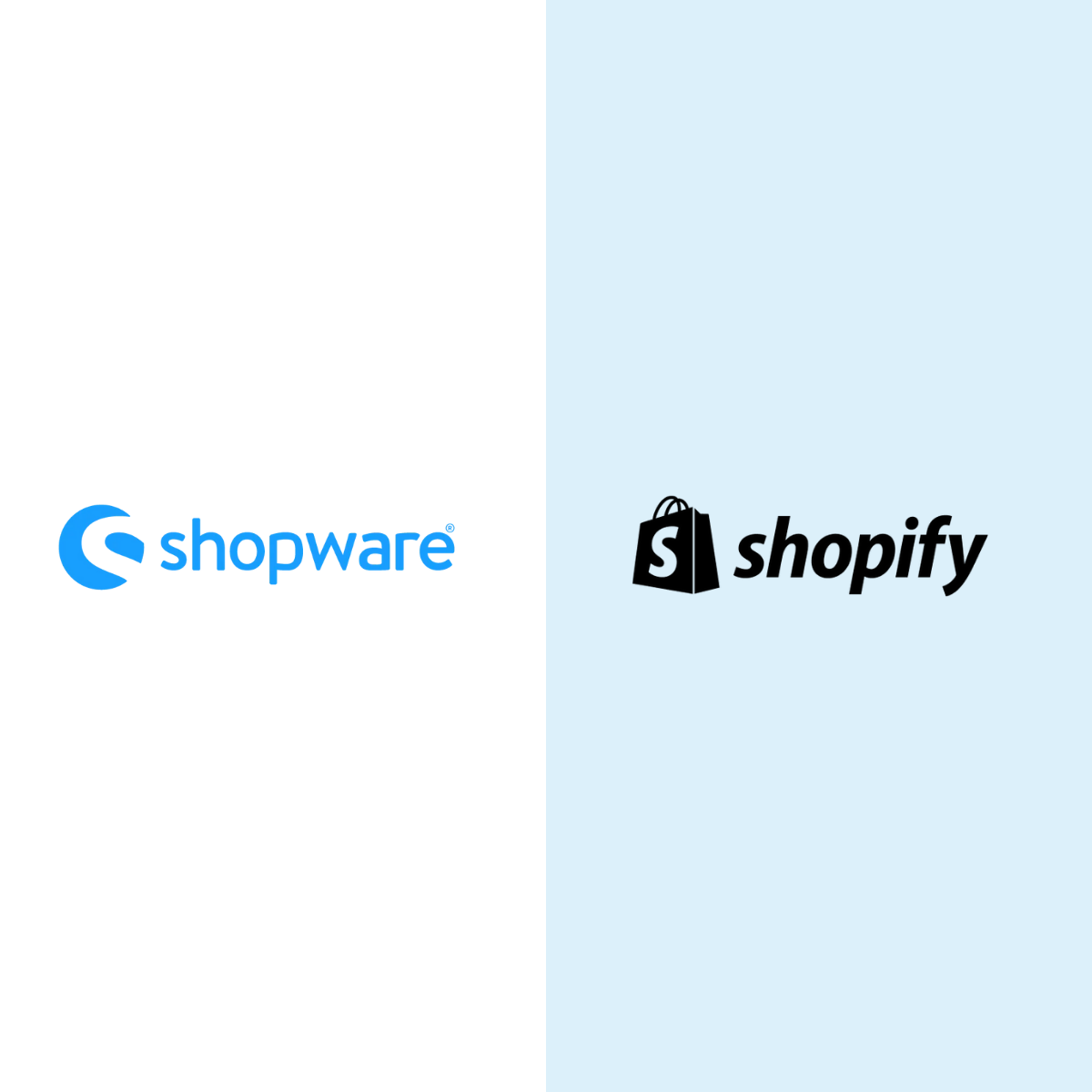6 Minutes
07. May 2025
Whether you’re a fast-growing scale-up or an established brand, choosing the right ecommerce platform is key to scaling, automating processes, or expanding internationally. Two of the most powerful options on the market: Shopify Plus and Shopware.
Both platforms have strong use cases—but they serve different needs. In this guide, we’ll break down the biggest differences so you can make a strategic decision, not just follow a gut feeling.
#1 Hosting & Infrastructure
Shopify Plus is fully cloud-based (SaaS). Your store runs on Shopify’s own servers. That means no hosting, no server maintenance, no manual security management. Shopify provides a global, highly scalable infrastructure with guaranteed uptime. You can customize a lot—but within a secure framework that prioritizes stability.
Shopware, originally designed as an on-premise solution, puts hosting in your hands. You (or your agency) manage the infrastructure, updates, and scalability. While Shopware 6 now includes a cloud version, it relies on third-party servers, which adds complexity and setup effort.
In short:
✔ Shopify Plus is plug-and-play
✔ Shopware offers more control—but more complexity
#2 Maintenance & Updates
One major difference lies in how each platform handles updates.
Shopify Plus takes care of everything in the background: updates, patches, and new features happen automatically—no manual testing or downtime needed. Your store stays secure and up to date without lifting a finger.
Shopware, on the other hand, requires manual updates, especially if you use the self-hosted version. The more plugins and custom features you have, the more time-consuming updates become—even with the cloud version.
Pro tip: No internal IT team? Shopify will save you major headaches.
#3 Internationalization & Scalability
Selling globally? Platform capabilities here really matter.
Shopify Plus was built for international growth. Tools like Shopify Markets allow you to manage multi-country stores, currencies, tax logic, and local domains—out of the box. Plus, Shopify’s global CDN ensures fast load times everywhere.
- Multi-store functionality with Shopify Markets for different countries
- Automatic currency and tax calculations
- A strong framework that offers good performance worldwide
Shopware also supports international stores—but with more effort. You’ll often need third-party modules or custom development to get the same level of functionality.
Verdict: If you’re targeting multiple countries or rapid global scale, Shopify Plus makes it easier.
#4 Costs & Transparency
Shopware might appear cheaper at first—but long-term costs can escalate quickly.
Shopify offers a transparent pricing structure with four main plans, plus Shopify Plus for enterprise needs. Shopify Plus starts at around $2,300/month, which includes hosting, regular updates, security, and a suite of powerful features. Additional costs only apply for transaction fees, depending on the payment provider used.
For a full breakdown of Shopify's pricing plans and potential extra fees, check out our blog article on Shopify Costs.
Shopware offers flexible pricing, including a free Community Edition. But you’ll pay separately for hosting, maintenance, plugins, and development. The Shopware Evolve (Enterprise) version starts at ~€2,400/month—plus infrastructure costs.
Bottom line: While Shopify Plus and Shopware may look similarly priced at first glance, the full picture often tells a different story. When comparing platforms, it’s essential to look beyond base fees and consider the total cost of ownership. Shopify Plus includes many features natively, while Shopware often requires paid extensions or custom development—which can drive up costs quickly and make budgeting more complex.
In our Total Cost of Ownership article, we break down all the costs you should expect in a real-world e-commerce setup—from infrastructure to maintenance to hidden extras.
#5 Customization & Extensibility
Both platforms are customizable—but in different ways.
Shopify Plus offers a robust ecosystem with APIs, themes, apps, and tools like Shopify Functions and Checkout Extensibility. You can add advanced features via over 8,000 vetted apps—many with no coding required. Development is faster and more modular.
Shopware, as an open-source platform, is highly customizable—from data models to the checkout. If you have in-house developers, you can build almost anything. But deep customization comes with time and cost overhead.
Our take: If you need complete flexibility and have tech resources, Shopware delivers. But for most growing brands, Shopify Plus strikes the better balance between flexibility and efficiency.
Final Verdict: Shopware or Shopify Plus?
Both platforms are strong—but suited for different businesses.
ChooseShopify Plus if you:
-
Want to scale quickly and globally
-
Prefer not to worry about updates or server management
-
Value platform stability and speed
-
Need to go live fast and stay agile
Choose Shopware if you:
-
Have highly specific technical requirements
-
Work with an experienced in-house development team
-
Are ready to invest in long-term infrastructure and maintenance
Considering a migration?
Thinking about switching from Shopware to Shopify Plus? Or trying to decide which platform is the better long-term fit for your business? We’ve helped many brands make the move—with clear roadmaps, technical confidence, and business-first thinking.Explore our Shopify migration services.
Want to chat? Tell us your story—we’re happy to help.
